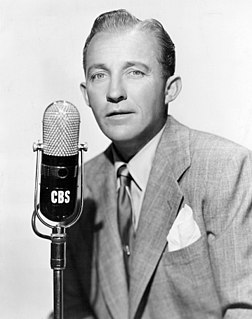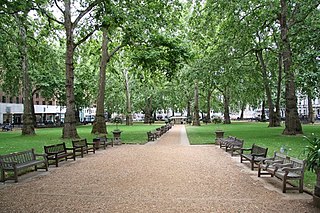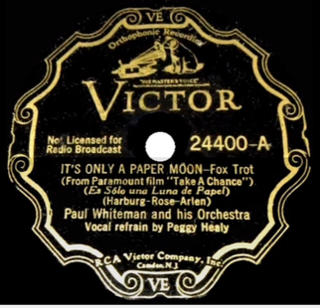Related Research Articles

Harry Lillis Crosby Jr., known professionally as Bing Crosby, was an American singer and actor. The first multimedia star, he was one of the most popular and influential musical artists of the 20th century worldwide. He was a leader in record sales, radio ratings, and motion picture grosses from 1926 to 1977. He made over 70 feature films and recorded more than 1,600 songs.

"A Nightingale Sang in Berkeley Square" is a British romantic popular song written in 1939 and published in 1940, with lyrics by Eric Maschwitz and music by Manning Sherwin.

John Francis Burke was an American lyricist, successful and prolific between the 1920s and 1950s. His work is considered part of the Great American Songbook.

Marcella Levy, known professionally as Marcy Levy and Marcella Detroit, is an American singer, songwriter, and guitarist. She co-wrote the 1977 Eric Clapton hit "Lay Down Sally" and released her debut album Marcella in 1982. She joined Shakespears Sister in 1988 with ex-Bananarama member Siobhan Fahey. Their first two albums, Sacred Heart (1989), and Hormonally Yours (1992), both reached the top 10 of the UK Albums Chart. Detroit sang the lead vocals on their biggest hit, "Stay", which spent eight consecutive weeks at number one on the UK Singles Chart in 1992. Detroit left the band in 1993 and had a UK top 20 hit with "I Believe" in 1994. She formed the Marcy Levy Band in 2002, and finished third in the 2010 ITV series Popstar to Operastar.

"The Little Drummer Boy" is a popular Christmas song written by American composer Katherine Kennicott Davis in 1941. First recorded in 1951 by the Trapp Family, the song was further popularized by a 1958 recording by the Harry Simeone Chorale; the Simeone version was re-released successfully for several years, and the song has been recorded many times since. In the lyrics, the singer relates how, as a poor young boy, he was summoned by the Magi to the Nativity of Jesus. Without a gift for the Infant, the little drummer boy played his drum with approval from Jesus's mother, Mary, recalling, "I played my best for him" and "He smiled at me".
"Blue Moon" is a classic popular song written by Richard Rodgers and Lorenz Hart in 1934. This may be the first instance of the familiar "50s progression" in a popular song, and it has become a standard ballad. Early recordings included those by Connee Boswell and by Al Bowlly in 1935. The song was a hit twice in 1949, with successful recordings in the U.S. by Billy Eckstine and Mel Tormé.
"Oh, What a Beautiful Mornin'" is the opening song from the musical Oklahoma!, which premiered on Broadway in 1943. It was written by composer Richard Rodgers and lyricist/librettist Oscar Hammerstein II. The leading male character in Oklahoma!, Curly McLain, sings the song at the beginning of the first scene of the musical. The refrain runs: "Oh, what a beautiful mornin'! / Oh, what a beautiful day! / I've got a beautiful feelin' / Ev'rythin's goin' my way." Curly's "brimming optimism is perfectly captured by Rodgers' ebullient music and Hammerstein's buoyant pastoral lyrics."
"Silver Bells" is a popular Christmas song composed by Jay Livingston and Ray Evans.
"I've Grown Accustomed to Her Face" is a song from the 1956 musical My Fair Lady, with music by Frederick Loewe and lyrics by Alan Jay Lerner. It was originally performed by Rex Harrison as Professor Henry Higgins who also performed it in the 1964 film version.

"It's Only a Paper Moon" is a popular song published in 1933 with music by Harold Arlen and lyrics by Yip Harburg and Billy Rose.

"Sweet Leilani" is a song featured in the 1937 film, Waikiki Wedding. It won the Academy Award for Best Original Song, and Bing Crosby's record became one of the biggest hits of 1937.
"I've Got The World on a String" is a 1932 popular jazz song composed by Harold Arlen, with lyrics written by Ted Koehler. It was written for the twenty-first edition of the Cotton Club series which opened on October 23, 1932, the first of the Cotton Club Parades.

Bing: A Musical Autobiography was Bing Crosby's fourth Decca vinyl LP, recorded and released in 1954.
"Love in Bloom" is a popular song with music by Ralph Rainger and lyrics by Leo Robin, published in 1934. It was introduced in the film She Loves Me Not by Bing Crosby and Kitty Carlisle. It remained familiar for many years thereafter as the theme song of Jack Benny, played at the opening of his radio and television programs.

"The Gold Diggers' Song " is a song from the 1933 Warner Bros. film Gold Diggers of 1933, sung in the opening sequence by Ginger Rogers and chorus. The entire song is never performed in the 1933 movie, though it introduces the film in the opening scene. Later in the movie, the tune is heard off stage in rehearsal as the director continues a discussion on camera about other matters.
"I've Got a Crush on You" is a song composed by George Gershwin, with lyrics by Ira Gershwin. It is unique among Gershwin compositions in that it was used for two different Broadway productions: Treasure Girl (1928), when it was introduced by Clifton Webb and Mary Hay, and Strike Up the Band (1930), when it was sung by Doris Carson and Gordon Smith. It was later included in the tribute musical Nice Work If You Can Get It (2012), in which it was sung by Jennifer Laura Thompson. When covered by Frank Sinatra he was a part of Columbia records.
"How Long Has This Been Going On?" is a song composed by George Gershwin, with lyrics by Ira Gershwin, for the musical Funny Face in 1928.
"June in January" is a popular song with music by Ralph Rainger and lyrics by Leo Robin, published in 1934.

She Loves Me Not is a 1934 American comedy film directed by Elliott Nugent and starring Bing Crosby and Miriam Hopkins. Based on the novel She Loves Me Not by Edward Hope and the subsequent play by Howard Lindsay, the film is about a cabaret dancer who witnesses a murder and is forced to hide from gangsters by disguising herself as a male Princeton student. Distributed by Paramount Pictures, the film has been remade twice as True to the Army (1942) and as How to Be Very, Very Popular in (1955), the latter starring Betty Grable. The film is notable for containing one of the first major performances of Bing Crosby, and it helped launch him to future stardom. This was also the last film that Miriam Hopkins made under her contract to Paramount Pictures, which began in the early 1930s upon her arrival in Hollywood. In 1935, the film received an Academy Award nomination for Best Original Song for "Love in Bloom", theme song of comedian Jack Benny.
Bing Crosby Sings with Al Jolson, Bob Hope, Dick Haymes and the Andrews Sisters is a Bing Crosby Decca Records studio 78rpm album of phonograph records featuring Crosby with several of Decca's top artists.
References
- ↑ "Little Man, You've Had A Busy Day". AllMusic . Rovi Corporation . Retrieved 24 February 2016.
- ↑ ""Little Man, You've Had a Busy Day" (1934)". Elsie Carlisle. Elsiecarlisle.com. Retrieved 24 February 2016.
- ↑ "Little Man, You've Had a Busy Day". International Lyrics Playground. Lyricsplayground.com. Retrieved 24 February 2016.
- ↑ "A Bing Crosby Discography". BING magazine. International Club Crosby. Retrieved October 11, 2017.
- ↑ "allmusic.com". allmusic.com. Retrieved October 11, 2017.
- ↑ Maxwell, Wes (19 February 2016). "Eric Clapton Announces New Album 'I Still Do' | CharityOwl". Austin Charity Owl. Charityowl.com. Archived from the original on 7 March 2016. Retrieved 24 February 2016.